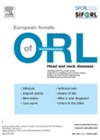
Journal Reviews
The never-ending vertigo
The authors comment on the Barany Society guidelines for bilateral vestibulopathy (BV). This is one of the murky entities of vestibulogy. By definition, patients will eventually lose vestibular function and don’t experience any vertigo. However, some patients still get recurrent...
Obstructive sleep apnoea in common vestibular disorders
The importance of getting a good night’s sleep is often acknowledged but may be particularly difficult to achieve for those with obstructive sleep apnoea (OSA). In addition to high blood pressure, increased risk of stroke and depression, balance problems may...
International classification of bilateral vestibulopathy (BVP)
In the past few years the Bárány Society have been standardising the diagnostic criteria for various vestibular disorders – International Classification of Vestibular Disorders (ICVD). Diagnosis of BVP relies on history, bedside clinical assessment and objective vestibular tests. The authors...
Acute peripheral vestibulopathy: is it really neuritis?
The pathophysiology of acute vestibular dysfunction has been debated for decades. By seeking to clarify the underlying aetiology, this study muddies the waters further by advocating systemic and intratympanic steroids as first line treatment if the aetiology is uncertain. The...
Visual vertigo and optokinetic response
This study measured differences in optokinetic responses (sitting, standing, with and without a static visual target) in three groups of people: those classified as having unilateral vestibular loss (n=10), unilateral loss with visual vertigo (n=8) and a control group (n=10)....









